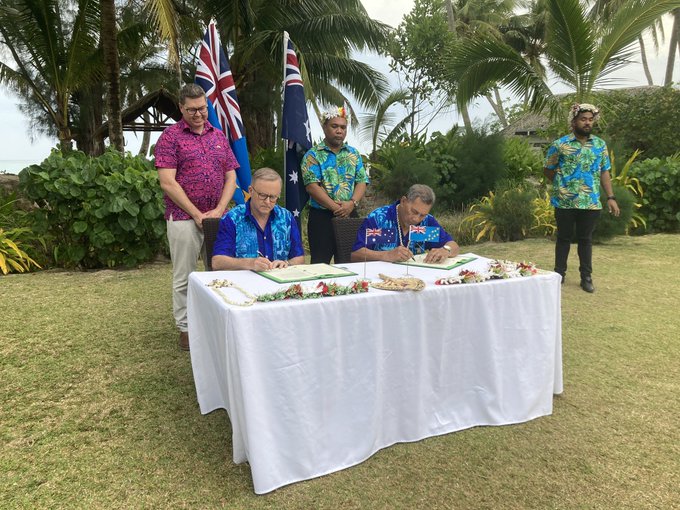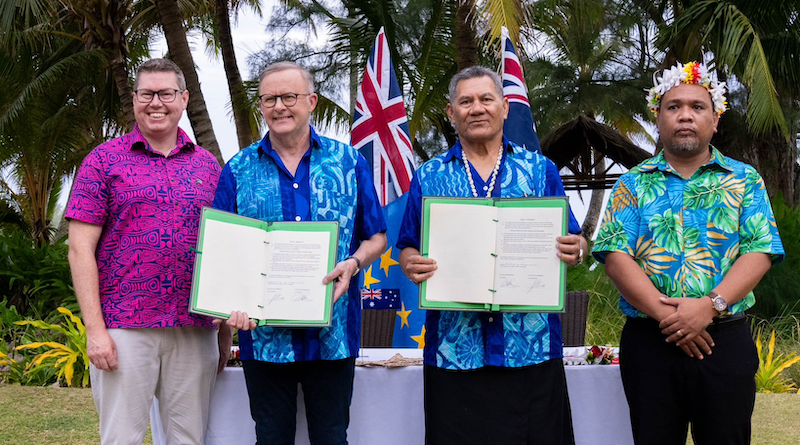By Enele Sopoaga, Leader of the Opposition and former Prime Minister of Tuvalu
The Australia-Tuvalu ‘falepili’ strategy is bullish and most alarming. The initiative was never consulted with the people of Tuvalu, nor was it ever raised in Parliament. It is not a climate change response. It is ceding Tuvalu sovereignty to Australia. It reverses Tuvalu political status to that of 45 years ago.
The Albanese-Kausea ‘falepili’ deal is exactly and literally that, secretive and scathing, between their very own houses. The devil of course is in the details since little is known in Tuvalu about the deal, and I suspect it is also of the same in Australia. The real concern now, given the secretive nature of the deal was formulated in both countries and the very dubious aims contained therein, is whether the deal is legally doable and sustainable, and whether or not Tuvalu as Australia’s territory will continue to be eligible to international arrangements of membership, ODA and special support from GEF, GCF.
Tuvalu enjoys strong cordial relations with Australia. It benefits from Australia’s ODA, bilateral relations, and by virtue of their membership in regional fora including in the Pacific Islands Forum. The bilateral relations are so strong it is hardly necessary to have another special bilateral treaty. Moreover, this deal is signed a mere month before the dissolution of Parliament on 24 November 2023, and General Elections in January 2024. It would be extremely naive to believe this deal did not aim as well as a dangling carrot to influence the elections outcome on 24 January and interfere in Tuvalu’s sovereignty.
But given the information shared on the media, Australia is offering to resettle 280 Tuvaluans per year in Australia as climate change refugees. In return Tuvalu will allow Canberra to take control of Tuvalu’s fishing rights, and national security within its EEZ and territorial waters. It is the view of this piece that this so-called treaty must be scrutinised within the bounds of international law, and first be ratified by the people of Tuvalu before enforcement. The sovereign independent Nation of Tuvalu cannot and must not be used as ‘guinea pigs’ in the zero-some game being dangerously played by metropolitan powers in the Pacific.
The deal was signed in the Cook Islands, a self-governing island territory in free association with the Government of New Zealand, at the margins of the 52nd Pacific Islands Forum Meeting, the regional body supposedly to be the paramount body of sovereign independent States of the Pacific. The PIF main concerns are primarily to deal with the political sovereignty, stability and security of the Pacific. It is unclear if the deal was an outcome of the PIF Leaders, and/or whether there has been a shift in PIF.
There are however serious problems with such a deal:
First, the Albnanese-Kausea deal was consulted and signed between the two prime ministers governments themselves without the knowledge of the people. It was never consulted with the people of Tuvalu nor by the Parliament of Tuvalu to better digest and comprehend the socio-economic and political implications of such an undertaking. Why so secretive, and who was hiding what. Speculations are flying everywhere, but one central rational that seems to be so overwhelming is honey money, for influence. Is Canberra the real harbour Tuvalu to park? What about the Saudis who have been ferrying the PM on their jets, and the Iranians to whom in 2012 we gave the Tuvalu flag of convenience to ship their oil to the world, against the UN and U.S trade sanctions.
It is not the first time that such an idea was floated around to Pacific Island countries. At the behest of hosting the 50th Pacific Islands Forum Meeting in Tuvalu August 2019, former Australian prime minister Kevin Rudd wrote an essay suggesting for the three micro-States in the PIF, Nauru, Kiribati and Tuvalu to be subsumed under some territorial arrangements with Australia. As the then Prime Minister of Tuvalu and host of the PIF Meeting, I rejected the idea as outright disrespectful and imperial colonialist.
Kevin Rudd is now Australia’s Ambassador to the U.S which may explain why there is a return to the original proposal as it seems to be aligned with the AUKUS security pact.
It is with similar sentiments that the proposed deal as now offered by Australia and signed with Tuvalu at the Cook Islands, must be considered appropriately within the bounds of international law and practices. Tuvalu’s political status now is reversed. The signed treaty must be ratified first by the Tuvalu Parliament before it enters into force.

Second, for the two prime ministers to advocate the application of climate change refugees to Tuvaluans who might be displaced by sea level rise and climate change is misplaced and naive. There is no such a thing as climate change refugees. Based on the 1951 Convention on Refugees “refugees are people displaced by political conflicts” in their own countries. To force an interpretation that Tuvaluans are “climate change refugees” is to self-serve and self-admit that the world is giving-up not only on Tuvalu, but also on honouring the commitments and the responsibility to account to the devastating damages that have been inflicted upon people, in Australia as well.
This deal, it seems, is like to buy Tuvalu’s silence over Australia’s coal exports which will contribute to Tuvalu’s demise as a nation. It is a very high cost to pay to allow coal exports for a small intake of Tuvaluans. It is also most likely that the entry requirements for Tuvaluans to go to Australia will be difficult, so like in the NZ PAC the year quota will never be reached.
There needs to be established, urgently, not a military pact disguised as a climate change response, but an international convention to recognise and protect the rights of people affected by climate change so that when they are displaced or resettled in other countries, they must continue to enjoy their fundamental human rights to culture, living, food, shelter, education, health, choice, nationhood, security, etc… Strictly, the displaced Tuvaluans must be relocated and resettled as a one sovereign nation in a process recognised and managed in line with the appropriate UN arrangements.
It is also shameful for a Tuvalu leader to self-admit defeat to climate change and sea level rise by choosing the option for Tuvalu’s sovereignty to be re-colonised by the biggest GHG carbon emitters, Australia. This is cheap compromise. Quite clearly, the Falepili Union deal is defeatist and self-serving offering advantages only to Australia but not to Tuvalu. Simple logistical and political questions will arise: how are the annual intake of Tuvaluans to be selected? And where in Australia would they resettle the Tuvaluans, would they be given a choice.
Australia must stop bullying the weakest and vulnerable PICs like Tuvalu in the guise of a climate change response to reclaim for their full political sovereignty and control over their rights and security. They must adhere first and foremost honour its commitments to the Paris Agreement on real concrete climate change actions. Their lack of real tangible actions is the cause of climate change and sea level rise in Tuvalu.
Third and finally, the deal is setting a very awkward precedent for Small Island Developing States (SIDS) whose recognition to participate in international relations is premised on their being sovereign independent States under international law. Tuvalu is a member of the United Nations and is able to participate fully in that capacity by token of that it is recognised of its defined territory, population and full control of its rights and foreign policy. Perhaps having the deal signed in a self-governing entity as Cook Islands was not a coincidence given that Tuvalu’s very sovereignty was now being practically changed and reversed to the same category as that of Pacific territories.
Are we still eligible to be a sovereign independent Member in the UN, UNFCCC, WHO, Commonwealth, etc… And are we now required to seek Canberra’s approval on Tuvalu’s vote in the UN or elsewhere, there will of course be more votes for Australia.
Another serious concern is to what extent is the signed “falepili” pack, together with its consequential arrangements, is going to affect international relations in the future. Australia is not the only country that possesses huge lands and lots of money, and who can afford perhaps more to bribe other weak and vulnerable SIDS for favours of falepili. Where would Tuvalu stop auctioning its sovereignty for money, including to the Saudis. Recall at one stage in 2008 Tuvalu was labelled by the New York Times as akin to a money seeking “prostitute” for shifting its votes in the UN General Assembly to Iran, for a few extra dollars, despite that country’s human rights abuse and violations. Shameful.
The notion of “falepili” is traditionally understood in the Polynesian societies as referring to the practice of serving, caring, loving and looking after your friends, families, nearby houses and neighbours. But whilst it may be true, the “falepili” notion is not without protocols. There are boundaries and lines of responsibility to each other to be observed. You cannot simply walk across to your “falepili” and harvest other people’s bananas or taro, without the consent and approval of the owner – a red line.
The deal now signed by the PIF leaders for Tuvalu, will surely have implications for new definition and understanding for the small island developing States in international relations. It will have serious implications for the upcoming collaborations with the rest of the world on climate change including such as those to be held in Dubai come COP28 next month and into the future. Is Tuvalu’s voice in COPs and UN to be trusted? Will Tuvalu continue to have trust from the other SIDS and AOSIS Members?
In effect Tuvalu has given away its future to Australia. Australia continues to export coal at an alarming rate and this agreement is now placed to buy Tuvalu’s silence against these coal exports. It basically says that we don’t care if Tuvalu disappears, we will be able to live in Australia. This is shocking, a complete divestment of national interests. A classic example of neo-colonialsm.
The metropolitan powers not only in the Pacific but worldwide are once again redefining the terms of sovereignty of the SIDS on the basis of their powers. The falepili union treaty is far from being a climate change resettlement deal. It is in fact a power intervention, a bribery, and a military deal against China and others, and against the weak and vulnerable SIDS like Tuvalu.
SOURCE: PACNEWS















